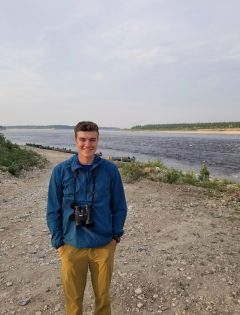Joe Bennett – PI
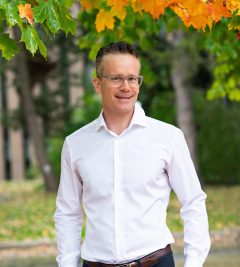
I’m an Associate Professor at the Institute of Environmental Science and Department of Biology at Carleton University, and co-director of the Geomatics and Landscape Ecology Laboratory (GLEL). My research touches on a variety of themes including conservation prioritization, invasion ecology, optimal monitoring, biogeography and spatial statistics. I have a particular interest in practical questions regarding management to protect threatened species and control invasive species. I also work on theoretical questions regarding the value of monitoring information and the determinants of community assembly in terrestrial and aquatic ecosystems.
Jaimie Vincent – Research Manager

I am a biologist and research manager in the lab. In this role, I help coordinate research projects and provide administrative support to the lab. For my M.Sc., I explored how eBird data could be used for songbird migratory connectivity research. I currently collaborate on projects related to biodiversity conservation, connectivity and community science.
Trina Rytwinski – Research Scientist

Research
My research focuses on understanding the circumstances in which roads and traffic affect wildlife populations. I am particularly interested in looking at species traits and their behavioural responses to roads, to determine which species or species groups are most vulnerable to road impacts, and determining ways to mitigate road effects. Most recently, I have focused on two road ecology related projects: (1) determining ways to improve knowledge on the influence of mitigation measures on wildlife populations through experiments, and (2) assessing the effectiveness of mitigation measures intended to decrease road related impacts on wildlife through meta-analysis. My research with Dr. Bennett and Dr. Cooke will involve conducting various systematic reviews; one of which is currently underway focusing on evaluating the effectiveness of non-native fish management projects for the restoration of freshwater ecosystems.
Background
I completed my PhD in 2012, at Carleton University, working with Dr. Lenore Fahrig in the Geomatics and Landscape Ecology Research Laboratory (GLEL) studying road effects on wildlife populations. After taking some maternity leave, I returned to the GLEL as a Post-doctoral fellow where I worked part-time from 2013-2016 with Dr. Fahrig on various road ecology projects while also working as a Contract Biologist for various universities and government e.g., Concordia University (Montreal), Canadian Wildlife Service (Ontario region), University of Melbourne (Victoria, Australia), Alterra, Wageningen University and Research Centre (Wageningen, The Netherlands). Prior to my PhD, I worked as a Research Biologist for the University of New Brunswick on a long-term study of the population dynamics of the northern flying squirrel in relation to habitat fragmentation in Fundy National Park, NB. Previous education: M.Sc. Biology, Carleton University (2004-2006); B.Sc. Biology (with Honours), Cape Breton University (2000-2004).
Personal website: https://trinarytwinski.ca/
Jeff Hanson – Postdoc
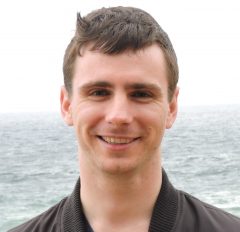
I am interested in helping people make better decisions to conserve biodiversity. My research focuses on incorporating novel datasets into conservation planning exercises (e.g. establishing new protected areas), applying optimisation algorithms to find optimal solutions to conservation problems, and identifying cost-effective surrogate data that can inform conservation decisions when high quality expensive data are not available (e.g. genetic data). I also develop decision support tools to help others apply my findings to their own work. At Carleton University, I am working with Prof. Bennett to optimise the allocation of resources for establishing new protected areas and survey programmes from a shared budget. I hope to provide guidelines that conservation practitioners can use when deciding which places to survey so they can use remaining funds to establish protected areas in the places that will maximize biodiversity persistence.
Personal website: https://jeffrey-hanson.com
Courtney Robichaud – Postdoc
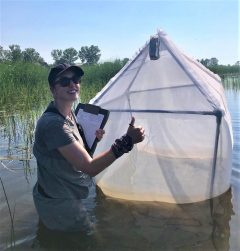
As a scientist, I am interested in how we can use science to better conserve ecosystems and the species they support. As a community ecologist with interests in invasive species, conservation, and ecological restoration I am also particularly dedicated to collaborative research that addresses the complex ecological problems we face in Canada. I completed a BES with joint honours in Environmental Resources Studies and Biology at the University of Waterloo and completed my PhD in Biology at UW in 2021. Over the last six years, my research has addressed questions around the management of invasive Phragmites australis in freshwater marshes. I have prioritized research that government, NGO, and community partners have identified as important including assessing the risk that herbicide presents to freshwater ecosystems, and how native species and species at risk use invaded and treated marsh habitat. My research has involved studying numerous communities including plants, invertebrates, and bird communities (marsh birds and aerial insectivores). Beyond this work, I am also a scientist working on mangrove restoration with Gaea Conservation, leading a CIEE Working Group, and am dedicated to equity and justice in science. In the Bennett Lab, I will be developing and applying decision support tools to optimize biodiversity monitoring and conservation efforts. You can keep up with my work on my website https://crobichaud.weebly.com/.
Sahebeh Karimi – Postdoc
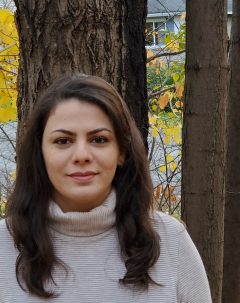
I am a spatial analyst. I am interested in studying the spatial distribution of ecosystem services, species and their interactions.
During my Ph.D., I tried to find how land-use change affects riverine ecosystem services in Iran. The results of my thesis were used by decision makers for making more ecological- and environmental-friendly decisions like determining the environmental flow of the Karaj River in Iran.
In the Bennett Lab, I am working on prioritizing lands for biodiversity conservation across Canada under land-use/cover change and climate change drivers.
Tim Alamenciak – Postdoc
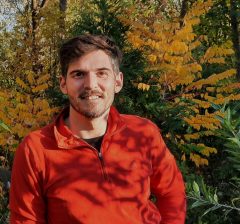
I am a conservation and restoration ecology researcher passionate about engaging the public in this work and taking effective action on the massive challenges facing our planet. My work with the Bennett Lab looks at the effectiveness and outcomes of temporarily conserved areas and conservation easement agreements. I am actively working to improve knowledge mobilization in the lab by developing resources and workshops for researchers.
My educational background is diverse and multi-disciplinary, starting with an Honours Bachelor of Arts in Peace and Conflict Studies (University of Waterloo, 2010), where I first became interested in community engagement and decision-making. I worked as a journalist at the Toronto Star and TVO after earning a Master of Arts in Journalism degree (Toronto Metropolitan University, 2012). I completed my PhD in Social and Ecological Sustainability (University of Waterloo, 2024) under the supervision of Dr. Stephen Murphy. My dissertation focused on increasing volunteer engagement in conservation and restoration by analyzing motivations, organizational structure and grassroots organizing techniques. I am committed to teaching and knowledge mobilization, and earned the Certificate in University Teaching (University of Waterloo, 2022).
I live in Kitchener, Ontario, with my wife Emily and our son Ollie. I am an avid woodworker, hand papermaker and occasional baker.
Personal website: https://tim-a.ca
Iman Momeni Dehaghi – PhD (co-supervised with Lenore Fahrig)

During my graduate studies in Environmental Science at University of Tehran, Iran, I applied Systematic Conservation Planning (SCP) concept, as one of the very first attempts in Iran, to find an optimum solution for configuration of reserves in Golestan province, Iran. Upon graduating with a Master of Science in Environmental Science, I served as an Environmental Impact Assessment (EIA) expert, for a few years, in consulting engineering companies in Iran. Afterwards, in order to improve my skills in reserve selection, habitat suitability mapping, and corridor suitability mapping, I spent a year at Helmholtz Center for Environmental Research (UFZ) in Germany as a guest researcher.
Currently, I am a PhD student at Carleton University, co-supervised by Dr. Lenore Fahrig and Dr. Joseph Bennett and my research focus is to understand the impact of road caused mortality on monarch butterfly population and migration.
Brandon Edwards – PhD (co-supervised with Adam Smith)
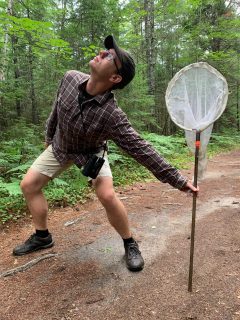
I completed my BSc in 2020 at the University of Guelph, majoring in Mathematical Science (Statistics stream). My research interests lie at the intersection of statistics, computer science, and ornithology. I was involved with research throughout my undergraduate degree, focusing on developing an efficient agent-based modelling toward management decisions of the endangered Piping Plover. My current research at Carleton University and Environment and Climate Change Canada (with Dr Adam Smith as a co-supervisor) is investigating methods to move toward an integrated modelling framework to estimate status and trends of North American birds. I have always felt extremely connected to the natural world and spend much of my free time birding. The wonderment, awe, and magic that bird migration consistently brings each year is constant inspiration for me to do good research, and to help where I can to improve efforts for bird conservation.
Personal website: https://brandonedwards.ca
Ana Hernández – PhD
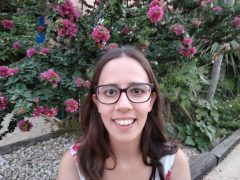
After completing my BSc. in Conservation Biology (St. Lawrence University) and my MSc. in Biodiversity and Conservation in Tropical Areas (UIMP-CSIC) I join Dr. Bennett’s lab as a new international PhD student from Spain. I am interested in a variety of topics such as species distribution models (SDM), the design of protected natural spaces, and policies to solve conservation problems. My current research focuses on improving rare plant detectability methods.
Recently, I worked as a research assistant at the National Museum of Natural Sciences in Spain to develop Pinus pinaster growth models, and at the Royal Botanical Garden of Madrid where I conducted my MSc. thesis exploring the biology of the moss Ceratodon purpureus. These two experiences helped me develop better GIS and R practices, but I also learned lab techniques such as DNA extraction, PCR amplification, and gel electrophoresis.
When possible, I like to participate in science dissemination events and in 2019 I participated in an activity associated with the COP25 conference in Madrid where I presented the project “Damming in the Raquette River: A Case of Habitat Fragmentation”.
Apart from conservation biology, I enjoy learning new languages and volunteering in educational projects, especially those that aim to make science more accessible and attractive to children.
Reyd Smith – PhD (co-supervised with Dr. Jennifer Provencher)
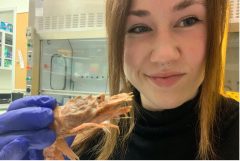
I completed my BSc (Honours) at the University of Manitoba, where I focused on how artificial light exposure alters the spring migration phenology of purple martins under the supervisor of Dr. Kevin Fraser. Next, I shifted to Arctic systems during my MSc at the University of Windsor alongside Dr. Oliver Love. My thesis was focused on inter-colony isotopic niche and the effects of cumulative stressors on reproductive phenology, hormones, and behaviour in female common eider ducks.
In collaboration with the Nunatsiavut Government, for my PhD I am examining accumulation patterns and the health implications of polycyclic aromatic compounds (PACs) in seabirds following a diesel oil spill in Newfoundland and Labrador. Common eider, black guillemot and great black-backed gulls will be examined for PACs, toxicokinetics and metabolomics, as well as isotopic niche characteristics to determine the routes and temporality of PAC exposure in the years after the oil spill.
Overall, my priorities are centred around the inclusion of Indigenous knowledge in all aspects of scientific research, including disseminating results back to the community. My general research interests include examining cumulative stressors such as contaminants, climate variables and foraging ecology, and the potential implications on health and reproductive success. Research aside, in my spare time, I dabble in birding, hiking/camping, snowboarding, gardening, and hanging out with my dog, Caspian.
Lucas Haddaway – PhD
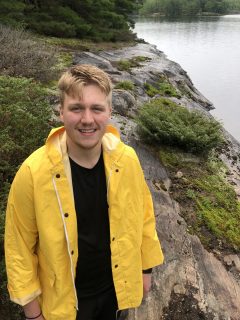
I completed my Bachelor of Science in Biology at the University of Waterloo in 2021. In my Honours thesis I focused on the ecology and behaviour of bat species during migratory stopover. Upon graduation I worked as a Conservation Technician at the rare Charitable Research Reserve in Cambridge Ontario. In this position I supported invasive species management, and turtle conservation efforts. My research interests fall under the broad category of conservation policy, and I am specifically interested in species at risk legislation, illegal wildlife trade, and private land conservation. My current research focuses on engaging with private landowners to identify how land management can be optimized to support the conservation of species at risk in Ontario.
Haille Huchton- MSc (co-supervised with Lenore Fahrig)
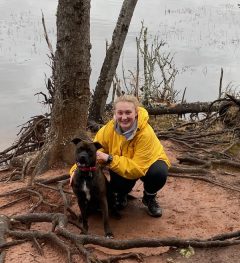
I completed my BSc in Environmental Science at Mount Allison University in 2022, with a focus on Environmental Management. My Honours thesis used geospatial analysis to investigate causes of wildlife-vehicle collisions in the Chignecto Isthmus area of the Canadian Maritimes. In the past, I have done research including work in wildlife rehabilitation, invasive plant habitat, shorebird tracking, and saltmarsh carbon mapping. My research interests include the use of GIS to better understand landscape ecology and conservation, as well as how human infrastructure influences wildlife habitat and movement.
My current research at Carleton is focused on habitat connectivity, particularly how current the accuracy of landscape-based modelling may be increased through the inclusion of wildlife movement data.
Lilli Gaston (she/her) – MSc Student (co-supervised with Dr. Rachel Buxton)
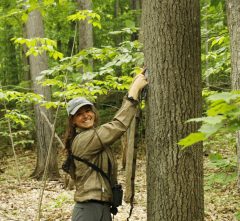
I completed my BSc in Biology at the University of Victoria in 2022. My undergraduate thesis explored the effects of anthropogenic disturbance on fisher distributions across Alberta. In general, I am interested in how species’ behaviours and distributions are shifting in response to anthropogenic landscape change, urban development, and climate change, and how this research can inform conservation initiatives across Canada. I have been very fortunate to work on a range of projects, such as monitoring large mammals in the boreal forest with the Applied Conservation Macroecology Lab, conducting migratory breeding bird surveys with Canadian Wildlife Service, and participating in species at risk conservation across the prairies with the Wilder Institute/Calgary Zoo.
At Carleton, I am using bioacoustic and camera trap data to investigate the effects of traffic mitigation and noise reduction on bird and mammal communities in urban protected areas. When I am not out admiring wildlife, I enjoy reading fiction, sea kayaking, baking pies, and spending time with my niece.
Justin Kreller – MSc (co-supervised with Emma Hudgins, University of Melbourne)
I joined the Bennett Lab in the fall of 2023 after being selected for the Weston Family Conservation Science Fellowship Program at the Nature Conservancy of Canada. My research, co-supervised by Drs. Emma Hudgins and Joe Bennett, is focused on building models to map the distribution and forecast the spread of some of Canada’s most invasive plant species in relation to landscape connectivity and climate change. The results of my project will help forecast the future burden of invasive plants and inform land stewardship and conservation efforts across the country.
Like most biology students, I enjoy being outdoors and performing fieldwork, notably in my recent work as a Student Biologist at the National Capital Commission. I also make regular contributions to the Ontario Breeding Bird Atlas, a project that has enabled me to take part in a canoe trip along the upper Winisk River as well as survey northeastern Ontario as a Wildlife Technician. It is this same passion for the environment that had pushed me to shift my career path towards conservation and pursue Fish & Wildlife Conservation Technician studies at Sault College (OCD, 2023) following my degree in Biomedical Mechanical Engineering from the University of Ottawa (BASc, 2020).
Outside of school and work, I can be found practicing sports, birding, camping/hiking, reading, enjoying music, or walking my sweet German shepherd, Atlas.
Kara Gerrow – MSc
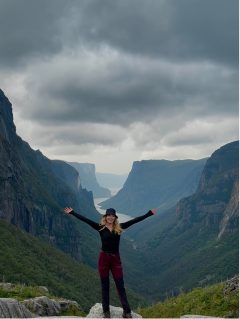
Growing up in rural Newfoundland, I spent a great deal of my childhood outside. This cultivated a deep love for both plants and animals, and lead to me perusing and completing my BSc. (Honours) in Biology at Memorial University of Newfoundland in 2018. My honour’s research studied the foraging behaviour of Common Murres fitted with geolocators at the species largest colony, Funk Island Ecological Reserve. After graduation I worked as a research assistant tracking and radio-collaring caribou on Fogo Island and snowshoe hare in Terra Nova National Park. From 2018-2023 I worked in both emergency and general practice veterinary medicine with varying roles from ICU to surgery. In 2023 longing to reconnect with nature and my roots, I worked as a private hiking guide in Gros Morne National Park’s backcountry. A summer of guiding combined with a two month stay in the Westjfords region of Iceland reignited my passion and love for biology. I spent the winter of 2024 working on a wetland restoration project with the NCC before starting as a master’s student in Dr. Bennett’s lab in the spring. My research interests include spatial ecology, species at risk and conservation policy. I am particularly passionate about avian and wildlife conservation tools and strategies, and how to use these tools to improve the status of species at risk in Canada. In my spare time you will often find me outside! I am an avid runner, hiker and paddleboarder and I enjoy going for bike rides with my German Shepherd, Nora.
Margaret Hanna – Honours student

I am a 4th year Environmental Science student at Carleton University and will be completing my honours thesis within the Bennett Lab. I strive to keep an open mind and learn about everything I can with the goal of developing a multidisciplinary mindset. I have over 1 year of experience working within the government including the National Capital Commission (NCC), Public Services and Procurement Canada (PSPC) and Environment and Climate Change Canada (ECCC). I love doing field work and being outdoors! Some of my hobbies include cycling, reading and playing with my cat! In the future, I hope to continue my education and eventually become a professor.
Richard Schuster – Affiliated Scientist

I am the Director of Spatial Planning and Innovation at the Nature Conservancy of Canada (NCC). I am responsible for the development and implementation of NCC’s conservation planning framework, strategic conservation planning research efforts, and new conservation technology initiatives.

